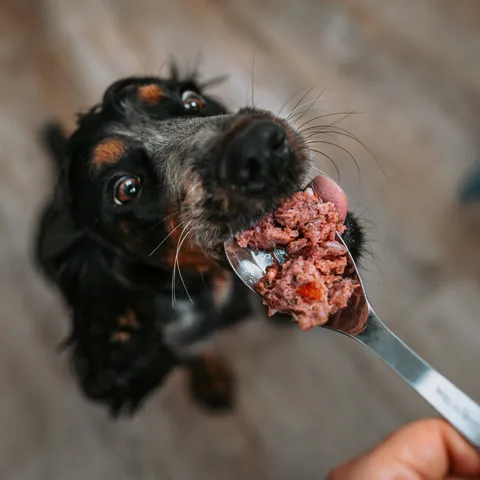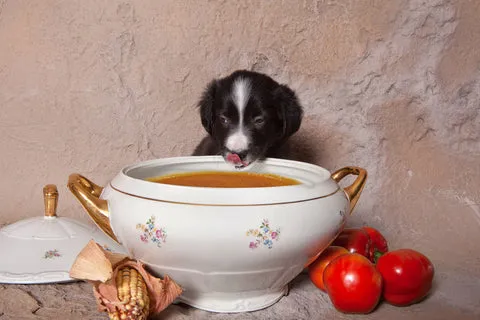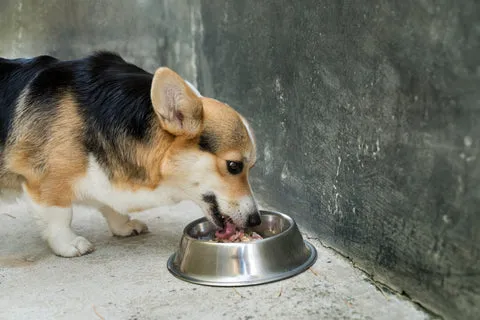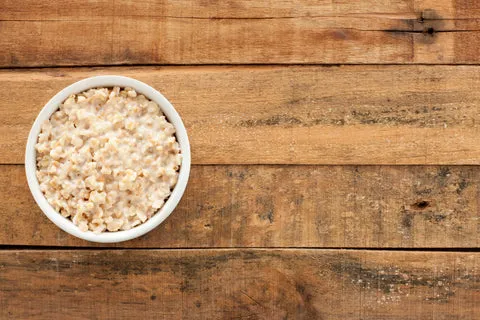When a tiny bundle of joy like a puppy falls ill, it can be incredibly distressing for pet parents. Puppies, much like human babies, are delicate and prone to various ailments, and a loss of appetite or an upset stomach is a common sign that something isn’t right. While their usual puppy food might be ideal when they’re healthy, knowing What To Give A Sick Puppy To Eat can be a real challenge. Their developing digestive systems require special care, and providing them with easily digestible, nutritious options is crucial for their recovery and to help boost their energy levels.
This guide from Dog Care Story aims to equip you with the knowledge to support your sick puppy through gentle nutrition. We’ll explore the best bland and nutritious foods suitable for a puppy with an upset stomach, along with essential feeding guidelines and when it’s critical to consult your veterinarian. Remember, this information is for guidance, and a vet’s professional advice is always the best course of action when your puppy is unwell.
General Guidelines for Feeding a Sick Puppy
Caring for a sick puppy goes beyond just offering food; it involves understanding their unique needs during a vulnerable time. Their small bodies and rapidly developing systems mean they need particular attention when unwell.
When to Seek Immediate Veterinary Care
Before attempting any home remedies or dietary changes, it’s paramount to know when a veterinary visit is non-negotiable. Always consult your vet if your puppy:
- Is lethargic or unresponsive.
- Has severe or persistent vomiting (more than twice in 24 hours).
- Experiences prolonged diarrhea (over 24 hours) or bloody diarrhea.
- Shows signs of pain or discomfort.
- Has pale gums or difficulty breathing.
- Is not drinking water and appears dehydrated.
These symptoms could indicate a serious underlying condition that requires urgent medical attention.
Importance of Hydration
Dehydration is a significant risk for sick puppies, especially with vomiting or diarrhea. Always ensure your puppy has access to fresh, clean water. If they are not drinking, offer ice chips or a veterinarian-approved electrolyte solution in small, frequent amounts. Sometimes, puppies may lap up bone broth (prepared safely, as detailed below) which can also aid hydration and provide essential nutrients.
Small, Frequent Meals
Instead of large meals, which can overwhelm a sensitive stomach, offer very small portions of bland food frequently throughout the day. This reduces the burden on their digestive system and helps maintain their blood sugar levels. Start with a tablespoon or two, and gradually increase the amount if they tolerate it well.
Introducing New Foods Gradually
When your puppy begins to show signs of improvement and is ready to transition back to their regular diet, do so gradually. Mix a small amount of their regular food with the bland diet, slowly increasing the proportion of their normal food over several days. This prevents further stomach upset.
Avoiding Harmful Foods
While this guide focuses on what to give a sick puppy, it’s equally important to know what not to give. Avoid fatty foods, rich treats, dairy products (other than plain yogurt if tolerated), and any human foods with seasonings, garlic, onions, or artificial sweeteners. For a broader understanding of what to avoid, you might find our article on what meat to not feed dogs and what fruits shouldn t dogs eat helpful, keeping in mind that puppies can be even more sensitive than adult dogs.
10 Best Bland and Nutritious Foods for a Sick Puppy
When your puppy isn’t feeling well, a plain, bland diet is usually best. These options are gentle on a sensitive stomach and provide necessary nutrients for recovery.
1. Boiled White Meat (Chicken or Turkey)
 A close-up of plain, boiled chicken breast, sliced into small, easily digestible pieces for a sick puppy, placed in a small ceramic bowl.
A close-up of plain, boiled chicken breast, sliced into small, easily digestible pieces for a sick puppy, placed in a small ceramic bowl.
Plain boiled white meat, such as chicken or turkey breast, is an excellent choice for a sick puppy. It’s easy to digest and provides lean protein essential for healing without adding unnecessary fat that could further upset their stomach. Always ensure all skin and bones are removed, as bones pose a choking hazard and splintering risk, and skin adds fat.
Preparation:
- Rinse the meat thoroughly under cold water.
- Remove any fat, skin, or bones.
- Place the meat in a pot and cover with water. Bring to a boil, then reduce heat and simmer for 15-20 minutes until thoroughly cooked.
- Once cooked, drain the water and shred or cut the meat into very small, bite-sized pieces appropriate for your puppy’s size.
- Allow to cool completely before serving. You can offer it alone or mixed with white rice.
2. White Rice
White rice is a staple in bland diets for sick dogs and puppies due to its easy digestibility and binding properties, which can help firm up loose stools. While brown rice is more nutritious, its higher fiber content can be too harsh for an upset puppy stomach. The blandness of white rice makes it a safer choice.
 A small, eager puppy looking up expectantly at an empty food bowl, with a hint of white rice in the background.
A small, eager puppy looking up expectantly at an empty food bowl, with a hint of white rice in the background.
Preparation:
- Rinse the rice under cold water to remove excess starch.
- Add the rice to a pot, using two parts water to one part rice. Avoid adding salt.
- Bring to a boil, then reduce to a simmer. Cover the pan and cook on low heat for about 18 minutes, or until all the water is absorbed.
- Allow to rest and cool. Fluff with a fork and serve in small portions, often mixed with boiled chicken.
3. Plain Sweet Potatoes
Cooked sweet potatoes are a fantastic source of vitamins (A, C, B6), fiber, and minerals like calcium, iron, and magnesium. They are incredibly gentle on a puppy’s stomach and intestines. The fiber content can help regulate digestion, addressing both diarrhea and mild constipation.
 Several slices of cooked, peeled sweet potato arranged neatly on a wooden surface, ready to be mashed for a puppy.
Several slices of cooked, peeled sweet potato arranged neatly on a wooden surface, ready to be mashed for a puppy.
Preparation:
- Never feed raw sweet potatoes, as they are hard to digest.
- Peel the skins, chop the potatoes into small chunks, and boil them in water until very soft.
- Drain the water and mash the sweet potatoes thoroughly, ensuring no lumps.
- Allow to cool completely before serving in small amounts.
4. Pumpkin (Pureed)
Pureed pumpkin is another excellent option for soothing a sick puppy’s stomach. Like sweet potatoes, it’s rich in vitamins that support the immune system and high in fiber, which helps regulate digestion. It can be beneficial for both diarrhea and constipation.
 A cute husky puppy with a playful expression, posing next to a carved pumpkin slice that resembles a smile, symbolizing the benefits of pumpkin.
A cute husky puppy with a playful expression, posing next to a carved pumpkin slice that resembles a smile, symbolizing the benefits of pumpkin.
Preparation:
- Use plain canned pumpkin puree (not pumpkin pie filling, which contains sugar and spices) or fresh cooked and pureed pumpkin.
- Ensure there are no added sugars, spices, or other ingredients.
- Add a small amount (1-2 tablespoons for puppies, depending on size) to their bland meal.
5. Homemade Bone Broth
Bone broth is incredibly beneficial for sick puppies. It’s packed with essential nutrients, minerals like sodium and potassium, and is highly palatable, making it an excellent way to encourage hydration when a puppy is reluctant to drink. Its low-carbohydrate nature and easy digestibility make it gentle on an upset stomach.
 A playful puppy licking a small bowl of homemade bone broth, demonstrating its palatability and hydrating benefits.
A playful puppy licking a small bowl of homemade bone broth, demonstrating its palatability and hydrating benefits.
Preparation:
- Use beef, pork marrow bones, or chicken/turkey bones. Avoid bones that splinter easily.
- Place bones in a large pot, cover with several inches of water, and simmer on low heat for 20-24 hours. A splash of apple cider vinegar can help extract minerals.
- Strain the broth carefully to remove all bones and solids.
- Allow to cool, then skim off any excess fat. Serve the liquid in small amounts. Ensure no garlic or excessive salt is used during cooking, as these are harmful to puppies.
6. Meat-Based Baby Food
For puppies struggling to eat solid foods, stage 1 or 2 meat-based baby foods (such as chicken, lamb, or turkey) can be an effective and easily digestible option. Their smooth consistency is gentle on a sore mouth or sensitive stomach, and they can provide much-needed calories.
 Two adorable doodle puppies carefully eating soft, meat-based baby food from a shared plate, highlighting its ease of consumption for young, sick animals.
Two adorable doodle puppies carefully eating soft, meat-based baby food from a shared plate, highlighting its ease of consumption for young, sick animals.
Important Note: Always check the ingredients carefully. Ensure the baby food contains only meat and no harmful additives like garlic powder, onion powder, or excessive salt, which are toxic to puppies. Consult your vet if you are unsure about any ingredients.
7. Plain, Poached Fish
Fish, particularly white fish like cod or haddock, is a good source of healthy fats (especially omega-3s in salmon, but start with white fish for sick puppies) and vitamins, which can support a puppy’s immune system and recovery. The strong smell of fish can also entice a puppy with a suppressed appetite to eat.
 A small corgi puppy happily eating plain, poached fish from its bowl, showing how appealing this nutritious option can be.
A small corgi puppy happily eating plain, poached fish from its bowl, showing how appealing this nutritious option can be.
Preparation:
- Poach the fish by adding it to a pan of water, bringing to a boil, then reducing and simmering for 10-15 minutes until cooked through.
- Carefully remove all bones (even tiny ones) and flake the fish into very small pieces suitable for a puppy.
- Allow to cool completely before serving.
8. Plain Oatmeal
Plain, cooked oatmeal made from rolled oats can help soothe an upset puppy stomach. It’s high in soluble fiber, which can aid constipation and reduce stomach inflammation due to its antioxidant properties. Always offer it without any sugar, artificial sweeteners, or flavorings.
 A warm bowl of plain, cooked oatmeal on a wooden table, signifying a comforting and easily digestible meal option for a sick puppy.
A warm bowl of plain, cooked oatmeal on a wooden table, signifying a comforting and easily digestible meal option for a sick puppy.
Preparation:
- Cook plain rolled oats with water until soft. Avoid instant oatmeal, which often contains additives.
- Let it cool thoroughly.
- Serve in very small amounts. Too much fiber can sometimes worsen diarrhea, so moderation is key for puppies.
9. Unsweetened Plain Yogurt
Plain, unsweetened yogurt, rich in probiotics, can support a puppy’s gut health and aid digestion. It can be particularly helpful if your puppy has recently been on antibiotics, as it helps replenish beneficial gut bacteria. Ensure it contains live and active cultures and no added sugars or artificial sweeteners like xylitol (which is highly toxic to dogs).
 A playful puppy with a dollop of unsweetened plain yogurt on its nose, showcasing the appeal and benefits of probiotics for gut health.
A playful puppy with a dollop of unsweetened plain yogurt on its nose, showcasing the appeal and benefits of probiotics for gut health.
Serve in very small quantities. While beneficial, some puppies may be lactose intolerant, so introduce it cautiously and observe for any adverse reactions. It can be a refreshing cool treat on a warm day, especially if frozen.
10. Scrambled or Boiled Eggs
If your puppy is not actively vomiting, eggs are an excellent source of easily digestible protein and a great energy booster, especially if they are feeling lethargic after an illness. They are gentle on the stomach and packed with essential amino acids.
Preparation:
- Scramble or boil eggs without any butter, oil, or seasonings. Plain is best.
- Chop into small, manageable pieces for your puppy.
- Crucial Note: Avoid giving eggs if your puppy is actively vomiting, as the fat content, even minimal, could exacerbate nausea.
When to Avoid Certain Foods or Seek Vet Advice Immediately
Knowing what to feed your sick puppy is vital, but understanding when not to feed them certain things or when to immediately contact your veterinarian is equally important. While the bland foods listed above are generally safe, always consider your puppy’s specific symptoms.
If your puppy has severe or continuous vomiting, offering food might do more harm than good and could lead to aspiration. In such cases, your vet might recommend withholding food for a short period to allow their stomach to rest, while focusing on hydration. If your puppy exhibits extreme lethargy, prolonged refusal to eat or drink, significant abdominal pain, or blood in their stool or vomit, these are emergencies requiring immediate veterinary attention. These signs can indicate serious conditions like parvovirus, foreign body ingestion, or severe infections.
For further reading on ingredients to avoid, you can check our articles on what fruits can dog not have and what can german shepherds eat and not eat, applying the strict ‘puppy’ filter to all recommendations. Remember, a puppy’s immune system and digestive tract are still developing, making them more vulnerable to toxins and digestive upsets.
Addressing Puppy Food Allergies and Sensitivities
Sometimes, a puppy’s recurring stomach issues aren’t just a temporary illness but a sign of underlying food allergies or sensitivities. Recognizing these signs early can help you manage their health long-term.
Signs of Food Allergies in Puppies:
- Chronic vomiting or diarrhea
- Excessive itching, skin rashes, or ear infections
- Poor coat quality
- Gassiness or bloating
- Licking paws excessively
If your puppy regularly suffers from an upset stomach or frequently exhibits these symptoms, it’s crucial to consult your veterinarian. They can help diagnose food allergies through elimination diets or other diagnostic methods.
For puppies with diagnosed allergies or sensitivities, a vet-recommended hypoallergenic diet is essential. This often involves novel protein sources (like duck, venison, or insect protein) or hydrolyzed protein diets where proteins are broken down into smaller components, making them less likely to trigger an immune response. Grain-free options might also be considered if a grain allergy is suspected, though it’s important to discuss this with your vet to ensure balanced nutrition.
The goal is to provide a complete and nutritionally balanced diet that avoids the specific allergens while still promoting healthy growth and development. This is a journey best undertaken with professional veterinary guidance.
Conclusion
Caring for a sick puppy can be a stressful experience, but providing them with a gentle, nutritious diet is a significant step towards their recovery. Remember, the primary goal when your puppy is unwell is to offer easily digestible foods that support their healing process and maintain hydration. The bland diet options discussed – from boiled white meat and white rice to pumpkin and bone broth – are excellent choices for soothing an upset stomach and providing essential energy.
However, the most important takeaway is the critical role of your veterinarian. While home care and a bland diet can be helpful for mild upsets, never hesitate to seek professional medical advice. A vet can accurately diagnose the underlying cause of your puppy’s illness and recommend the most appropriate course of treatment. Your puppy’s health and well-being are paramount, and proactive, informed care is the best way to ensure they bounce back to their happy, playful selves. For more insights on canine health and nutrition, explore additional articles on Dog Care Story, such as what can i feed a sick dog for adult canine companions.
References
- American Veterinary Medical Association (AVMA). (n.d.). Pet Care resources.
- ASPCA (The American Society for the Prevention of Cruelty to Animals). (n.d.). Poisonous Plants and People Foods to Avoid Feeding Your Pets guides.
- Small Animal Nutrition. (Various academic sources and veterinary textbooks).
- Your local veterinarian for personalized advice and diagnosis.
